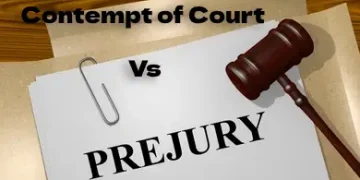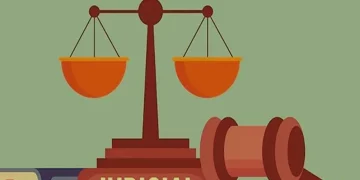The procedure for the trial of criminal cases is elaborated in the Code of Criminal Procedure, 1973. Now the question is how a criminal case is transferred from one court to another court and what are the grounds for it? The answer is in Chapter XXXI of CrPC which covers the transfer of cases under CrPC from Section 406 to 411. The primary objective of introducing these provisions is to ensure justice is delivered to people, and to facilitate this, the right to appeal is also provided.
Sometimes for some people, it is really hard to travel from one place to another place especially for women to attend court proceedings. in such cases, the question of transferring the case from one court to another court is a leap of hope. The framers of the Constitution had laid certain provisions to transfer criminal cases from one court to another to tackle this issue. It’s important to note that the right to appeal in the Supreme Court is only available in exceptional circumstances, as the original court of criminal appeal is typically the High Court, according to the Code of Criminal Procedure.
- Definition of Transfer of Cases under CrPC
- Different Types of Transfer of Cases under the Criminal Procedure Code, 1973
- Grounds for Transfer of Cases under CrPC
- Section 407 of CrPC, The Power of High Court to Transfer Cases and Appeals
- Section 408 – Power of Sessions Judge to Transfer Cases and Appeals
- Section 409 of CrPC, How Withdrawal of Cases and Appeals is made by Sessions Judge?
- Section 410 of CrPC, How to Withdraw Cases before Judicial Magistrate Court?
- Section 411 of CrPc, How to Withdraw Cases before Executive Magistrates?
- Section 412 of CrPC, Reasons to be recorded
- Conclusion
Definition of Transfer of Cases under CrPC
The process of transferring cases under the Code of Criminal Procedure (CrPC) involves transferring a criminal case or appeal from one court to another, either within the same jurisdiction or to a different jurisdiction. CrPC includes provisions that confer authority upon higher judicial bodies to effectuate transfers under specific circumstances. The overarching objectives are to guarantee a fair trial, uphold the tenets of justice, and enhance the convenience of the parties engaged in the legal proceedings.
Despite the transfer, the essential nature of the trial or the relief granted to the involved parties remains unaltered. The power to transfer cases in CrPC is vested in various authorities, encompassing the Supreme Court, High Courts, Sessions Judges, Chief Judicial Magistrates, and Executive Magistrates, depending on the level and nature of the case. Such transfers may be prompted by jurisdictional concerns or apprehensions regarding the composition of the court.
The cardinal principle of dispensing justice equitably and transparently is consistently maintained throughout the judicial system. The judiciary, as the bedrock of justice, staunchly upholds the impartiality of trial proceedings. Both civil and criminal codes of procedure provide valid justifications for the transfer of cases between courts.
Some important Case Laws:
- State of Maharashtra v. Praful Desai (2003): In this case, the Supreme Court emphasized the importance of ensuring a fair trial and held that the power to transfer cases should be exercised judiciously to prevent any perceived bias or prejudice.
- Swaran Singh v. State of Punjab (2000): The Supreme Court, in this case, highlighted the significance of transferring cases when there is a genuine apprehension of bias or lack of a fair trial in the current jurisdiction, underscoring the need to safeguard the principles of justice.
- Arnesh Kumar v. State of Bihar (2014): This case underscored the role of the judiciary in protecting the rights of the accused and ensuring a fair trial, emphasizing that the power to transfer cases should be exercised when circumstances warrant such a move for the interest of justice.
Different Types of Transfer of Cases under the Criminal Procedure Code, 1973
The Code of Criminal Procedure delineates six categories of case transfers:
- The Supreme Court holds the authority to transfer cases from one state to another.
- A state’s High Court possesses the prerogative to transfer cases from one court to another, with either equal or superior jurisdiction, and may even opt to transfer a case to itself.
- The Sessions Judge is empowered to transfer cases from one court within their Sessions Division to another.
- The Sessions Judge can retract cases from Additional Sessions Judges, Assistant Sessions Judges, or the Chief Judicial Magistrate.
- The Chief Judicial Magistrate holds the capability to withdraw cases from any magistrate under their jurisdiction.
- Executive magistrates, inclusive of district and sub-district magistrates, retain the authority to dismiss cases.
Grounds for Transfer of Cases under CrPC
Chapter XXXI deals with the transfer of criminal cases under CrPC. This chapter contains Sections 406 to 412, which details the rules and procedures for transferring criminal proceedings. The rules are as follows:
Section 406 of CrPC, Power of Supreme Court to Transfer Cases and Appeals
Section 406 of the Criminal Procedure Code confers upon the Supreme Court the discretionary authority to transfer cases and appeals. This extensive discretionary power empowers the Supreme Court to transfer any case or appeal to the High Court of any other State in the country, with the overarching objective of upholding the principles of justice and natural justice.
Applications seeking the transfer of a case or appeal pending in a High Court can be submitted to the Supreme Court by:
- Individuals who harbor apprehensions of experiencing injustice during court proceedings.
- Individuals who hold a belief that they will not receive impartial justice in the court where the case is currently under consideration.
- The Attorney General or Advocate General of India.
The authority of the Supreme Court to transfer cases and appeals according to Section 406 is entirely discretionary, and the applicant is not obligated to definitively substantiate the reasons behind their request for transfer. To initiate the process, the applicant must furnish an affidavit or submit an affirmative motion in the prescribed format as per Section 406, unless the applicant holds the position of the country’s Advocate General or Attorney General.
The jurisdiction of the Supreme Court to transfer cases and appeals extends to matters pending before any subordinate court throughout the country. However, during the proceedings, the Supreme Court ensures the adherence to principles of fair and natural justice when deciding on the transfer of criminal cases as per the Code of Criminal Procedure. If the applicant possesses reasonable grounds to believe that certain factors may impede their right to a fair trial, they are entitled to approach the court with the appropriate jurisdiction.
This provision facilitates the transfer of cases and appeals from the Supreme Court to another High Court or from one High Court to another, and such transfers are deemed in the interest of justice. Applications for such transfers can be made by the Attorney General of India, the Advocate General of the concerned state, or any other party involved or interested in the case, supported by an affidavit or confirmation. Any individual found to have submitted a fraudulent application under Section 2000 may be obligated to compensate the opposing party.
In the matter of Suman Gambhir v. State of Rajasthan & Ors., where both complainants and accused reside in Delhi, and a civil suit between them is pending in Delhi, the state has expressed no objection to transferring the case from Rajasthan to Delhi.
In the case of Fajlor Rahman alias Mohamod Fajloo alias Raju & Ors. v. State of Punjab & Anr., the petitioners sought the transfer of a criminal case against them to the Chief Judicial Magistrate’s Court in Jalandhar Filler, Punjab, Barpeta, Assam, invoking Sections 363-A, 366, and 120-B. The grounds for the transfer, as per the provisions of CrPC, included potential life-threatening situations, as petitioners 1 and 2 had eloped to marry. The Supreme Court, taking into account the interest of justice and the well-being of the petitioners, approved the transfer of the case.
In the case Vishwanath Gupta & Anr. v. State of Uttaranchal & Anr., involving Transfer Petitions of 2004 (Crl.) No. 254-55, along with No. 89 of 2005, the Supreme Court determined that the petitioners sought the transfer of the case under CrPC due to their inability to engage the defendant’s lawyers. The court did not grant permission to the District Collector’s Association when an affidavit was presented, indicating that the petitioner had already been provided with legal counsel.
In Sukhdev Singh Sodhi vs. The Chief Justice and Judges of The PEPSU High Court, the court clarified that the authority to transfer cases to the Supreme Court does not extend to the transfer of any ongoing contempt proceedings in the High Court.
The discretion and authority to transfer cases and appeals, as per Section 406, are not only discretionary but also constrained. Section 406 does not empower the Supreme Court to transfer ongoing investigations from one police station to another solely for the purpose of filing an FIR. If the Supreme Court deems the filed petition frivolous and lacking substantive rights, the party submitting the petition may be directed to pay compensation exceeding one thousand rupees to the opposing party.
In the matter of Kaushalya Devi v. Mool Raj, the magistrate overseeing the case submitted an affidavit contesting the transfer application. The magistrate asserted that there was no doubt about the transfer being in the interest of justice. This is because, in such instances, the conditions for a fair and impartial trial are already compromised, given the judge’s involvement.
Section 407 of CrPC, The Power of High Court to Transfer Cases and Appeals
Section 407 of the Criminal Procedure Code empowers High Courts with the authority to transfer cases and appeals. The circumstances under which a High Court may order the transfer of a case or appeal include the following:
- When the High Court is convinced that ensuring the right to a fair and impartial hearing, as guaranteed under Article 21 of the Constitution of India, is not possible if the case is tried by subordinate courts.
- When there are extraordinary difficulties associated with the questions involved in the pending case.
- When the transfer is deemed necessary according to any provision under the Criminal Procedure Code.
- When the transfer order serves the general convenience of the parties or witnesses involved in the lawsuit.
Once the High Court is satisfied with the aforementioned grounds, it can issue the following orders:
- Directing the prosecution to take place in any court subordinate to it under sections 177 and 185 of the Code. However, no trial shall occur except in a court with jurisdiction over the case.
- Transferring a specific case or appeal, currently pending before any criminal court, to another criminal court within the jurisdiction of the High Court.
- Referring a specific case to the Sessions Court for trial.
- Transferring a specific case or appeal to itself (the High Court) for adjudication.
The authority to exercise the power of transfer by the High Court falls under the following Grounds:
When the lower court submits a report requesting the transfer of the appeal or case or when an interested party applies to the High Court seeking the transfer of a case or appeal, the High Court may exercise its discretion to transfer the case or appeal if it deems it in the interest of justice. It is important to note that the High Court should not entertain any application for transferring a case from one criminal court to another if it is made to the Sessions Court of another Sessions Division and has already been rejected.
The High Court, when utilizing its power to transfer cases and appeals, does so under specific circumstances, including when it believes that a fair, just, and impartial trial cannot be conducted in the current court, the case involves questions of unusual difficulty, specific provisions of the Criminal Procedure Code mandate the transfer, it is necessary for the convenience of the parties and witnesses, and when it serves the ends of justice. However, in the case of Baljit Singh & Anr. v. State of Jammu and Kashmir & Ors., the Supreme Court rejected the plea to transfer criminal cases from Jammu to Srinagar, citing that most witnesses were from Srinagar, and there was no need for the transfer since all witnesses from Jammu were already examined.
A case or appeal can be transferred under this section from one Criminal Court to another Criminal Court subordinate to the High Court or within its jurisdiction, to a Sessions Court for trial, or the High Court itself may try the case. In the case of Pal Singh & Anr. v. Central Bureau of Investigation & Ors., the Supreme Court clarified that a criminal case or appeal may be transferred from one district court to another within the same jurisdiction. There is no provision for inter-state transfer of cases in CrPC. Additionally, when a case is in its final stages of trial, and most witnesses have already been examined, a transfer may not be appropriate.
Transfer applications can be made by affidavits or confirmation, either by the report of the lower court or by an interested party. The High Court may also initiate the transfer on its own. In the case of Nirmal Singh v. the State of Haryana, the Supreme Court set aside the order of the Punjab and Haryana High Court, transferring the criminal case to Chandigarh based on the Sessions Judge of Ambala’s decision. The reasons for the transfer were not given, and many accused argued that engaging legal counsel in Chandigarh would incur additional costs. If a case is to be moved from one criminal court to another within the same Sessions division, the transfer application can be filed in the High Court only if the Sessions Judge has already rejected it.
Section 408 – Power of Sessions Judge to Transfer Cases and Appeals
Section 408 of the Criminal Procedure Code vests the Sessions Judge with the authority to transfer cases and appeals within their Sessions Division when it is deemed necessary in the interest of justice.
According to subsection 1 of Section 408, the Sessions Judge has the power to transfer cases under CrPC from one criminal court to another within the jurisdiction of their Sessions Division, aiming to serve the ends of justice.
Subsection 2 of Section 408 outlines specific instances in which the Sessions Judge can exercise the power to transfer cases under CrPC. This includes scenarios where a report is filed by the lower court requesting the transfer, as well as situations where an interested party or the court itself initiates an application for transfer at its discretion.
The provisions specified in subsections (3), (4), (5), (6), (7), and (9) of Section 407 also apply to the Sessions Judge when making any orders related to the authority while exercising the provisions referred to under subsection 1 of Section 407. These provisions apply to the Sessions Judge like their application to the High Court.
The Sessions Judge may exercise this power at their discretion or in response to a report filed by the lower court or an application made by a party. Additionally, certain provisions of Section 407 also apply to orders made under Section 408. For example:
- If the accused files a transfer petition, the High Court or the Sessions Judge may direct the accused to execute a bond with or without sureties. The accused must also provide written proof of such an application to the Public Prosecutor. No order shall be made on the merits of the application until 24 hours have elapsed between the filing of the notice and the application hearing.
- If a person is found to be filing fraudulent transfer applications, the High Court or the Sessions Judge may order the person to pay compensation up to Rs. 1000 (by the High Court) or Rs. 250 (by the Sessions Judge) to any party opposing the application.
Importantly, Section 407 or 408 shall not affect the Government Orders under Section 197.
Section 409 of CrPC, How Withdrawal of Cases and Appeals is made by Sessions Judge?
Under the Criminal Procedure Code, the Sessions Judge has the authority to withdraw or transfer a case or appeal from any Assistant Sessions Judge or Chief Judicial Magistrate under their jurisdiction. However, when it comes to an Additional Sessions Judge, this action can only be taken if the trial has not yet commenced. The Sessions Judge has the discretion to either conduct the trial or appeal in their court or transfer it to another court under the provisions outlined in the Code.
In the legal precedent set by the Agartala Bench of the Gauhati High Court in the case of Subrata Pal v. Ratna Gope & Anr., it was emphasized that if a case or appeal is withdrawn from the court of an Additional Sessions Judge, the Sessions Judge is required to submit a report to the High Court once the trial or proceedings have commenced. This report should provide the reasons for such withdrawal, as stipulated under Section 407(2) of the Criminal Procedure Code.
Section 410 of CrPC, How to Withdraw Cases before Judicial Magistrate Court?
Under the Criminal Procedure Code, the Chief Judicial Magistrate is vested with the authority to withdraw or recall any ongoing case before any Magistrate under their jurisdiction. Following withdrawal, the Chief Judicial Magistrate is permitted to refer the case to another Magistrate who possesses the competence to adjudicate and hear the matter.
Likewise, as per Section 192(2) of the CrPC, 1973, a Judicial Magistrate holds the power to withdraw and assume cognizance of any ongoing case before another Magistrate.
A precedent set by the Bombay High Court in the case of Mehfoos Khan & Anr. v. R. J. Parakh & Anr. clarified that the authority exercised by a Judicial Magistrate under Section 410 constitutes a judicial order rather than an administrative one. The terms “withdrawal” or “recall” in this context are akin to the concept of “transfer.” In cases where the state is the primary party in criminal proceedings, it retains the option to seek a transfer of the criminal case if there exist compelling reasons.
Section 411 of CrPc, How to Withdraw Cases before Executive Magistrates?
Sections 409, 410, and 411 of the Criminal Procedure Code grant Executive Magistrates the authority to withdraw or recall ongoing cases before a Subordinate Magistrate. Following withdrawal, an Executive Magistrate has the discretion to either adjudicate on the matter in their own court or effectuate the transfer of the case to another Subordinate Magistrate possessing the requisite competence. This statutory provision provides Executive Magistrates with the flexibility to address cases in a manner that aligns with the specific circumstances and demands of each situation.
Section 412 of CrPC, Reasons to be recorded
Section 412 of the Criminal Procedure Code mandates that when issuing transfer orders under Section 408, Section 409, Section 410, or Section 411, the rationale behind such transfers must be documented in writing. This provision safeguards against arbitrary transfers, emphasizing the necessity for fair, just, and compelling reasons to be explicitly articulated in the recorded justification for the transfer order.
Conclusion
The transfer of criminal cases under the Criminal Procedure Code (CrPC) serves as a vital mechanism to uphold the principles of justice and secure a fair and unbiased trial. Various provisions embedded in the CrPC confer the authority upon higher judicial bodies to effect transfers when compelling reasons necessitate such actions. This process is designed to address concerns like conflicts in jurisdiction, local prejudices, convenience for parties and witnesses, and the intricacies of the case.
Entities such as the Supreme Court, High Courts, Sessions Judges, Chief Judicial Magistrates, and Executive Magistrates are endowed with the power to transfer cases under CrPC. These transfers must be grounded in specific circumstances and meticulously recorded. By documenting the reasons for the transfer, transparency is ensured, and the transfer is carried out in a manner that is both just and equitable.
Ultimately, the objective of transferring cases under CrPC is to streamline the judicial proceedings, providing an appropriate platform for dispute resolution and upholding justice for all parties involved.
Relevanr Case Laws

















